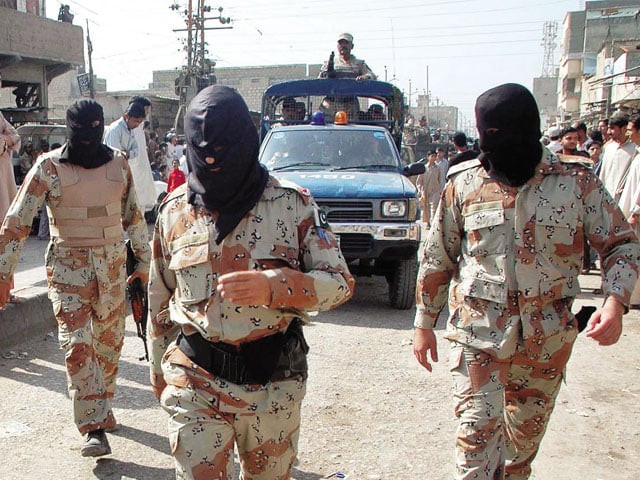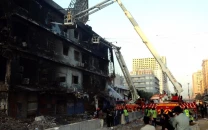Karachi’s trouble spot: Orangi under siege
Rangers round up over 400 ‘suspects’ in massive pre-dawn swoop.

Karachi’s trouble spot: Orangi under siege
As many as 700 personnel of the Pakistan Rangers Sindh descended upon Orangi Town early Tuesday morning, arresting over 400 hundred suspects during a sweeping unannounced search operation.
Dozens of weapons and ammunition were also reportedly seized. However, most of the detainees were later released after they were found innocent. Around 50 people remained in custody and were being questioned.
The operation began at around 6 am and ended around noon. Reports suggest that, before the house-to-house search, Rangers detained people on their way to work in passenger buses, motorcycles and private cars, as well as onlookers who did not have CNICs on them. Soon after, transport was suspended and areas were sealed off to launch a door-to-door operation, in which Rangers used ladder to jump into houses.
The Rangers later released most of the detainees after their families submitted their CNICs.
Interestingly, while the operation was under way, the government issued a notification regarding the extension in special powers of the Rangers for another three months.
The search operation created panic and chaos among the residents. People were confined to their houses until they could produce their CNICs.
Official sources said that the operation was conducted in collaboration with the local police. However, the police did not participate and were only there to assist, similar to the time the Rangers raided Kunwari Colony in Manghopir. Reports claim that the Rangers carried out the operation on the directives of the Sindh home department following the current wave of violence in the city, especially in parts of Orangi Town. A greater contingent is reportedly being called in for another house-to-house search operation in the area.
“The operation was not only carried out to target the killers but also to keep a check on lawlessness, the drug mafia and street criminals,” an official of the Sindh Rangers told The Express Tribune on the condition of anonymity. “The operation was also carried out on the pointation of suspects arrested during the recent violence.”
The detainees were hauled into trucks and shifted to unspecified locations. The official said that almost 70 to 80 per cent of the detainees were released shortly after they were found innocent.
The areas of Faqir Colony where the operation was carried out included Omer Baloch Mohalla and Mikati Para.
Aerial monitoring was also conducted during the operation to avoid the possibility of a suspect escaping.
Omer Baloch Mohalla is a Baloch dominated area of the Faqir Colony which falls under the jurisdiction of Mominabad police station. People from all ethnic backgrounds – but a majority of them Pakhtun, – live in the parts where the operation was conducted.
Area residents also protested against the large scale arrests. They claimed that the operation was one-sided and that the Rangers misbehaved with families and with females.
“Before launching such operations, the LEAs must have a list of the criminals and should only search those houses where they have information,” Haris Wakeel, a resident of Omer Baloch Mohalla said. “The LEAs tackled our mothers and sisters as though they were criminals.”
Resident Fazal Din, a daily wage earner, said the people of the area were already crippled by acute poverty, and found it extremely difficult to get work these days with the power and gas crisis under way. “I could not go to work due to today’s operation and I have to run my family at any cost; I do not have any money for my family today. Now who will pay me?” he said.
Another resident, Aman Khan, who was detained while on his way to work and then later released, said that he was arrested by the Rangers because he did not have his CNIC on him. “We avoid carrying CNICs and other documents with us because of looting incidents in the area,” he said. “It was an unannounced operation which is why I did not have my CNIC.”
On the other hand, residents of the surrounding areas were happy with the operation and were full of appreciation. “There are lots of criminals present in these localities and most of them are involved in the narcotics business,” said Lal Din, a resident of Urdu Chowk. “We are not just worried about the clashes between ethnic groups, we are troubled by the drug mafia and so we welcome the Rangers in this regard.”
Hidden identities: The men with black masks
Rangers’ officers and their guards covered their faces with black cloth masks, and also removed their nametags from their uniforms before entering Orangi town for the search operation.
A Rangers official told The Express Tribune that some personnel wore the black masks in order to protect their identities. In the past, there have been incidents when law enforcement authorities have been targeted.
“This is just a precautionary measure,” the Rangers officer said. He added that the mask served no other function as protecting one from gas shells.
He added that there was nothing odd about it because even commando units wear such masks when they conduct missions. He denied that this was done only to protect a few officers of the Rangers who went to the field to supervise the search operation.
Published in The Express Tribune, January 19th, 2011.



















COMMENTS
Comments are moderated and generally will be posted if they are on-topic and not abusive.
For more information, please see our Comments FAQ